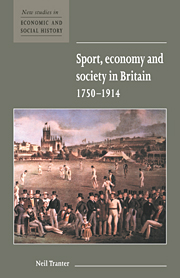7 - Agenda for research
Published online by Cambridge University Press: 18 December 2009
Summary
Harold Perkin, echoing the view of others before him, once observed that ‘the history of societies is more widely reflected in the way they spend their leisure than in their work or politics’ (Perkin, 1989: 145). If intended as a serious statement of fact even the most committed student of leisure history would probably consider this an exaggeration. If intended merely as recognition and justification of the growing interest historians had for some time been showing in the evolution and significance of leisure activities it is less contentious. In the context of that aspect of leisure activity which took the form of physical recreation a disproportionate share of this interest has focused on the century or so leading up to the outbreak of the First World War, when the bases of a modern sporting culture were first effectively laid. The result is that for the nineteenth and early twentieth centuries we already have at least a broad understanding of the way in which sport – its extent, timing and organisational structure, its patterns of diffusion, its causes and consequences, its economics, the age, sex, marital and sociooccupational composition of its participants and the behaviour of its players and spectators – was transformed by the rise of urbanindustrial society.
Yet, even for this period, there remain major gaps in our knowledge. If we are to achieve a more balanced appreciation of the nature of working-class sport, one of the requirements of future research must be to focus less on the new forms of codified, organised sport and more on what happened to traditional sports like dog racing, pedestrianism, pigeon-flying, quoiting, knurr and spell and long (or potshare) bowling, whose supporters were overwhelmingly working class but whose histories are still largely hidden.
- Type
- Chapter
- Information
- Sport, Economy and Society in Britain 1750–1914 , pp. 94 - 97Publisher: Cambridge University PressPrint publication year: 1998
- 1
- Cited by



